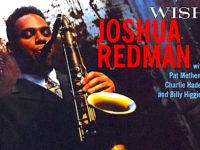Eric Alexander is a tenor sax specialist who comes from the same generation of reed players as Joshua Redman, who he finished second to in 1991 in that career-defining Thelonious Monk Institute sax competition, when Alexander was in early 20’s. Since then, he has been extremely prolific, churning out 29 albums as a leader (according to Allmusic.com). That’s even more astounding when you consider all the high-profile sideman work he’s done for jazz leading lights such as Mel Rhyne, Cecil Payne, Kenny Barron and Charles Earland.
Alexander’s sax style shows the unmistakable influence of tenor greats from the fifties and sixties, such as George Coleman, Hank Mobley, and of course, John Coltrane. It’s a sweet, soulful style that’s ballad-ready and yet, he can make some pretty sizzling runs when the situation calls for it. But by and large, even with a style that’s gotten to be distinguished, you could put him in the “old school” category of saxophonists, because it’s evident from his playing and song selection that he is a big believer in melody, swing and mood.
Last September 29, put forth his seventh disc for HighNote Records, fittingly titled Revival Of The Fittest. Indeed, Alexander continues to revive some of the fittest straight-ahead jazz from the fifties and sixties, and there were no corners cut to do it. His rhythm section for these sessions are Nat Reeves (bass) and Joe Farnsworth (drums), long time proven veterans whom Alexander has entrusted each to back him up for over ten years. For piano, Alexander selected the reliable stalwart and a fine leader in his own right, Harold Mabern. To top it off, Revival was recorded at the Rudy Van Gelder Studios with Van Gelder behind the controls. All that was needed was for Alexander to go out and perform. And, man, he did.
Ivan Lins’ standard “The Island” is a showcase for arguably one of the best romantic tenor players from his generation. He gives Mabern’s own “Too Late Back Baby” a spirited treatment, with a huge, fiery tone that is the closest he comes to sounding rough. “Revival,” the semi-title tune composed by one of his heroes, George Coleman, is a finger-snapping number performed so smoothly, it’s hard to notice the odd numbered bars and underlying rhythmic complexity of the song.
Alexander wanted to “make a mellower record,” so the rest of the fare ranges from ballads (“Yasashiku (Gently)”, “My Grown-Up Christmas List”, “Love-Wise”, etc.) to mid-tempo (You Must Believe In Spring”). In each case, except for the lone Alexander original “Yasashiku”, Alexander finds a way to interpret the song in not quite the way that it was originally conceived, but it often feels as if it could have been intended that way.
Eric Alexander might be considered a revivalist, and given his homage to the old masters, he’d probably agree with this. Make no mistake, though, nearly twenty years after being a Joshua Redman away from taking home the Monk Competition prize, Alexander is no polished hack. He’s a sax heavy who a generation or two ago would be placed right alongside many of his illustrious influences. Records like Revival Of The Fittest heartens fans of passionate, lush jazz, who know that there’s a contemporary performer dogmatically dedicated to the style, and doing it in his own tasteful, authoritative way.





Hi Pico
It's great to see a review of Eric Alexander.
Eric seems to have been a little 'left out' of many of the more modern listeners lists, due in part to his more mainstream approach. I love listening to the likes of Mark Turner, Ellery Eskelin, Paul Dunmall, Chris Potter, but at times it's great to settle back and listen to Eric Alexander just playing some good swinging tenor. I don't think he's made a bad CD as yet, it's more a problem of which one to buy/listen to – you don't need all 29. Young (up and coming) players could take few tips from Eric – more melody and not just technique ……… if you see what I mean.